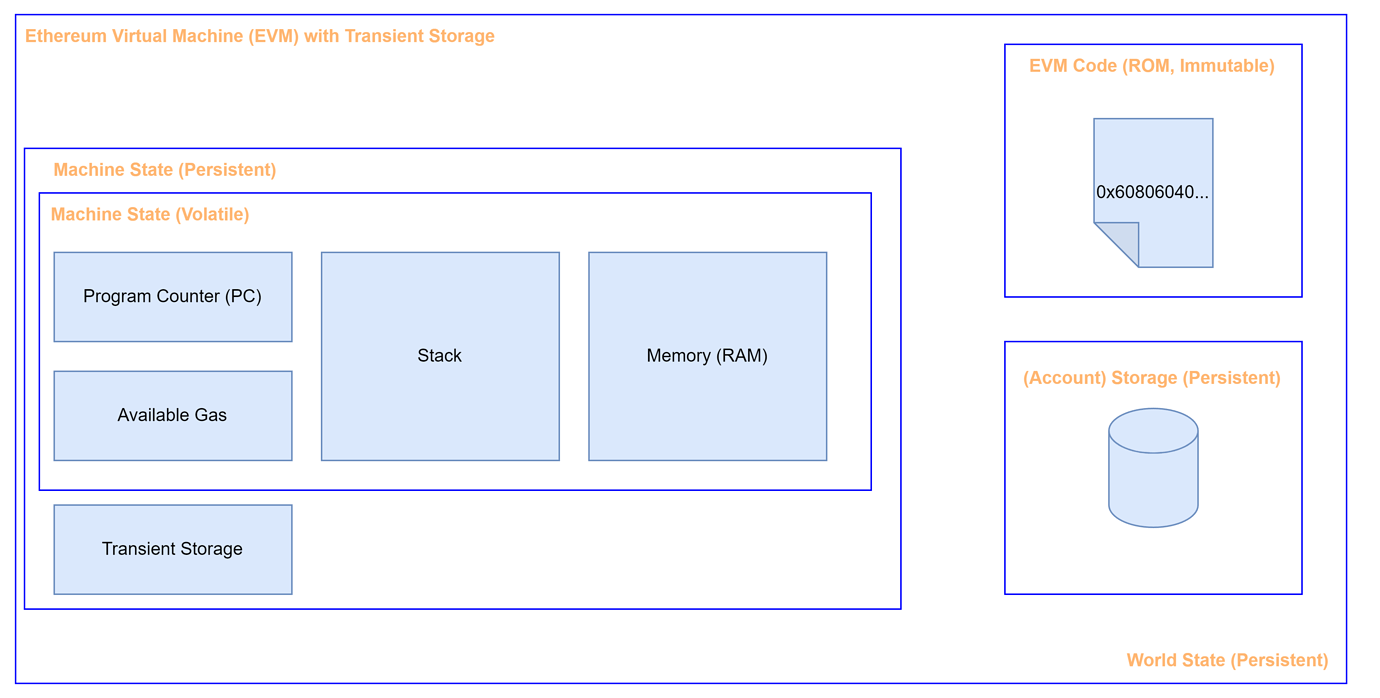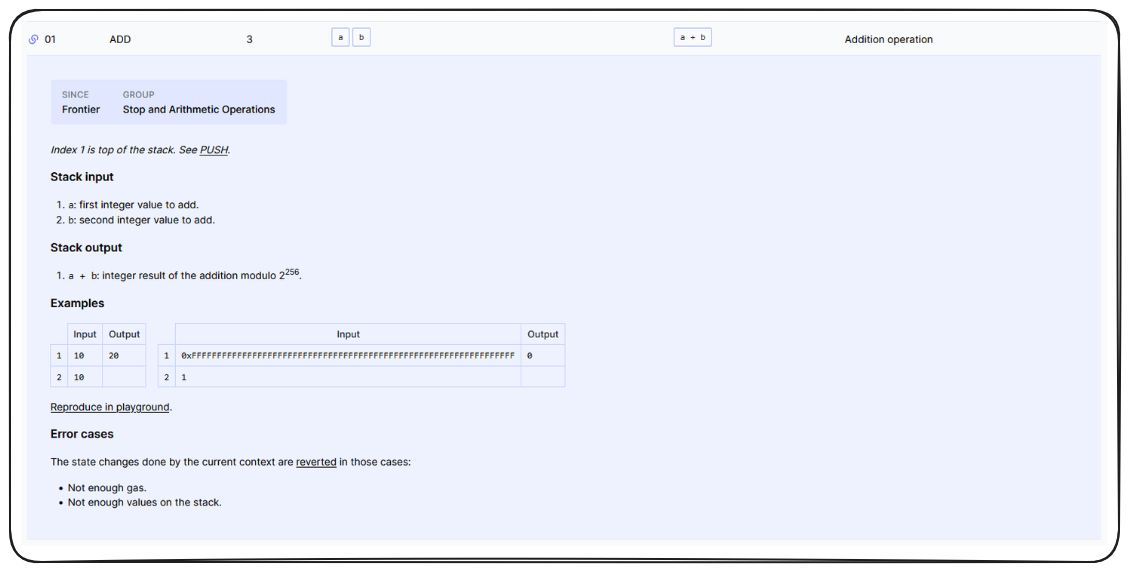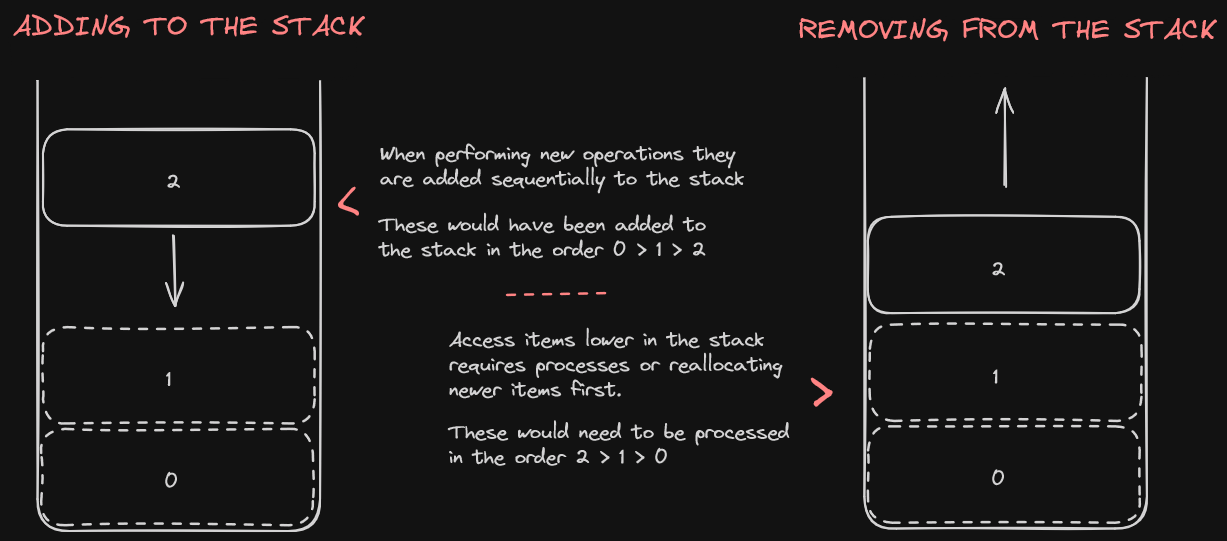5/5
_Follow along with this video:_ --- ## Understanding Solidity Variables and the Ethereum Virtual Machine (EVM) Let's look again at our Horse Store contract: ```js // SPDX-License-Identifier: GPL-3.0-only pragma solidity 0.8.20; contract HorseStore { uint256 numberOfHorses; function updateHorseNumber(uint256 newNumberOfHorses) external { numberOfHorses = newNumberOfHorses; } function readNumberOfHorses() external view returns (uint256) { return numberOfHorses; } } ``` In this example, `numberOfHorses` is a storage variable, it's going to persist on-chain after an execution completes. However, if we were to add a variable like `uint256 hello = 7` to our `updateHorseNumber()` function... ```js function updateHorseNumber(uint256 newNumberOfHorses) external { uint256 hello = 7; numberOfHorses = newNumberofHorses; } ``` ...this variable is held in memory while the function is executing and is discarded once execution completes and will be inaccessible. How does Solidity determine how these variables are handled? Let's reformat our earlier questions: 1. Where did this data come from? How did Remix know to send this data? 1. 0xe026c0170000000000000000000000000000000000000000000000000000000000000001 2. How does the EVM know how to interpret/interact with data? 2. How does Remix know to update the number of horses with this data? As developers, we usually let Solidity handle these complexities automatically. It silently allocates calldata, governs memory usage during execution, and seamlessly switches between variable types. But here's the twist: when coding in low-level bytecode, _we_ are responsible for managing memory allocation. Let's examine this brilliant visual that prominent developer Pascal shared on Twitter:  For our purposes, our focus will be the areas **Stack**, **Memory**, and **Storage**. ### The Stack When we want to perform computations on data, we have to consider where the data will be stored and the order of our computations. Of all the spaces in the image above, the cheapest location for this (from the perspective of gas) is going to be on `the stack`. If we take a look at the `ADD` opcode in [**evm.codes**](https://www.evm.codes/?fork=shanghai) we can see how this addition operation actually works.  `The stack` can quite literally be thought of as a stack. New operations must be placed on the top of the stack and processed or reallocated before operations lower in the stack can be performed. Hopefully this image will help clarifying the concept.  In the next lesson, we'll take a look at how `memory` and `storage` is handled differently from each other.
Follow along with this video:
Understanding Solidity Variables and the Ethereum Virtual Machine (EVM)
Let's look again at our Horse Store contract:
In this example, numberOfHorses is a storage variable, it's going to persist on-chain after an execution completes. However, if we were to add a variable like uint256 hello = 7 to our updateHorseNumber() function...
...this variable is held in memory while the function is executing and is discarded once execution completes and will be inaccessible.
How does Solidity determine how these variables are handled? Let's reformat our earlier questions:
Where did this data come from? How did Remix know to send this data?
0xe026c0170000000000000000000000000000000000000000000000000000000000000001
How does the EVM know how to interpret/interact with data?
How does Remix know to update the number of horses with this data?
As developers, we usually let Solidity handle these complexities automatically. It silently allocates calldata, governs memory usage during execution, and seamlessly switches between variable types. But here's the twist: when coding in low-level bytecode, we are responsible for managing memory allocation.
Let's examine this brilliant visual that prominent developer Pascal shared on Twitter:

For our purposes, our focus will be the areas Stack, Memory, and Storage.
The Stack
When we want to perform computations on data, we have to consider where the data will be stored and the order of our computations. Of all the spaces in the image above, the cheapest location for this (from the perspective of gas) is going to be on the stack.
If we take a look at the ADD opcode in evm.codes we can see how this addition operation actually works.

The stack can quite literally be thought of as a stack. New operations must be placed on the top of the stack and processed or reallocated before operations lower in the stack can be performed. Hopefully this image will help clarifying the concept.

In the next lesson, we'll take a look at how memory and storage is handled differently from each other.
EVM: The Stack
A deep dive into the EVM - The Stack - This lesson explains that the EVM is a stack machine and how that impacts the way we store and interact with data. In addition, it explains that data structures within the EVM are structured in a way that allows us to store data on the stack, memory, and storage.
Previous lesson
Previous
Next lesson
Next
Course Overview
About the course
What you'll learn
Assembly
Writing smart contracts using Huff and Yul
Ethereum Virtual Machine OPCodes
Formal verification testing
Smart contract invariant testing
Halmos, Certora, Kontrol
Course Description
Who is this course for?
- Smart contract security researchers
- Advanced Smart contract engineers
- Chief Security Officiers
- Security professionals
Potential Careers
Security researcher
$49,999 - $120,000 (avg. salary)
Smart Contract Auditor
$100,000 - $200,000 (avg. salary)
Meet your instructors
Guest lecturers:
Last updated on February 1, 2026
Duration: 30min
Duration: 4h 40min
Duration: 3h 58min
Duration: 1h 56min
Course Overview
About the course
What you'll learn
Assembly
Writing smart contracts using Huff and Yul
Ethereum Virtual Machine OPCodes
Formal verification testing
Smart contract invariant testing
Halmos, Certora, Kontrol
Course Description
Who is this course for?
- Smart contract security researchers
- Advanced Smart contract engineers
- Chief Security Officiers
- Security professionals
Potential Careers
Security researcher
$49,999 - $120,000 (avg. salary)
Smart Contract Auditor
$100,000 - $200,000 (avg. salary)
Meet your instructors
Guest lecturers:
Last updated on February 1, 2026
